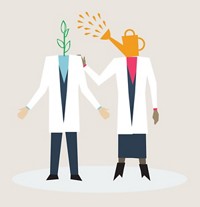Advertisement
Grab your lab coat. Let's get started
Welcome!
Welcome!
Create an account below to get 6 C&EN articles per month, receive newsletters and more - all free.
It seems this is your first time logging in online. Please enter the following information to continue.
As an ACS member you automatically get access to this site. All we need is few more details to create your reading experience.
Not you? Sign in with a different account.
Not you? Sign in with a different account.
ERROR 1
ERROR 1
ERROR 2
ERROR 2
ERROR 2
ERROR 2
ERROR 2
Password and Confirm password must match.
If you have an ACS member number, please enter it here so we can link this account to your membership. (optional)
ERROR 2
ACS values your privacy. By submitting your information, you are gaining access to C&EN and subscribing to our weekly newsletter. We use the information you provide to make your reading experience better, and we will never sell your data to third party members.
Career Tips
To assemble a diverse team, start early
by Brought to you by ACS Career Navigator
October 1, 2022
| A version of this story appeared in
Volume 100, Issue 35

Whether you’re looking for speakers for a panel discussion, team members for a new project, or volunteers for an outreach event, diversity is always valuable. For example, gender-diverse teams have been shown to produce more novel and higher-impact scientific ideas than teams without gender diversity (Proc. Natl. Acad. Sci. U.S.A. 2022, DOI: 10.1073/pnas.2200841119), and chemists from different fields can offer new ideas for outreach demonstrations. By intentionally including multiple kinds of diversity in your membership, you can ensure better outcomes not only for your project goals but also for team members. Here’s how:
Start early. Don’t wait until your group is assembled to determine whether it is diverse. By that point it’s too late. Instead, build diversity in from the beginning by thinking about what expertise you need to get the job done and what other perspectives might be useful. Consider all aspects of diversity—age, gender, ethnicity, disability status, education level, sector of work, etc. What skills and know-how do team members really need? For example, is 10 years of experience with a certain subject truly required, or has it simply been a habit in the past to choose people according to seniority?
Use associations. Professional or affinity groups can help connect you with people with specific backgrounds. A few such groups can be found in a past column (C&EN, July 6, 2020, page 38), but there are many more. Reviewing groups’ speaker and member lists, attending their events, and talking to members can be great ways to make connections in a new community.
Think differently. As science becomes more interdisciplinary, the teams that do it must have additional and varied kinds of expertise. Do you need to expand your team to include people with different backgrounds and skills? Can your meetings be virtual or hybrid instead of always in person? Can meetings be at a different time of day to accommodate various schedules? Can some things be done asynchronously?
Ask. Never assume the answer is no. Just because someone is busy, important, or at a prestigious institution doesn’t mean they will turn you down. And conversely, just because they are from a smaller or less elite organization doesn’t mean they can’t make a valuable contribution. Even if they aren’t available, they may be able to suggest someone else or provide a source of leads.
If appropriate, make sure everyone knows how to get involved or recommend others who might be assets to the team. A great candidate may just be waiting for an invitation.
Listen. Once people start accepting your offers, use them to fill out the team. Have them help determine what expertise and experiences are missing. Ask them to search their networks for people who would complement those who have already accepted. Make sure everyone on the team is valued, is included, and feels comfortable speaking up.
Doing the same thing you’ve always done, with the same people who have always done it, may seem like the easier path. But just because something has always been done a certain way doesn’t mean it’s the only way. Putting in a little more effort up front to create a team with a broad range of experience and expertise will ensure its success in the long run.
Get involved in the discussion. The ACS Career Tips column is published the first issue of every month in C&EN. Send your comments and ideas for topics for future columns to careernavigator@acs.org.





Join the conversation
Contact the reporter
Submit a Letter to the Editor for publication
Engage with us on Twitter